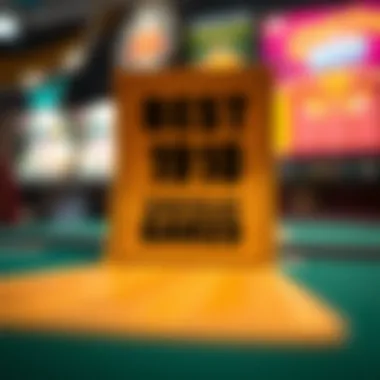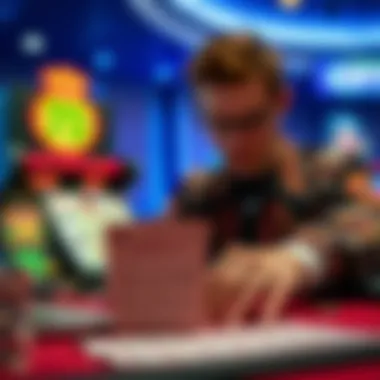Mastering Scratch Off Tickets: Finding the Best Odds


Intro
Scratch off tickets have long enticed players with the promise of instant wealth. The thrill of revealing a winning combination offers excitement that few other forms of gambling can match. Yet, amidst the glimmering allure of these tickets lies a complex world of odds, strategy, and a bit of good fortune. For enthusiasts eager to snag a solid return, understanding the intricacies of scratch off games is a vital part of the journey.
Navigating the myriad options available can seem daunting at first glance. Factors such as ticket price, jackpot size, and the odds of winning—displayed on the back of the ticket—serve as crucial pointers for discerning players. However, many find themselves simply scratching tickets at random, unaware of the subtle details that could enhance their chances.
This article aims not just to peel back the layers of curiosity but to equip readers with valuable insights that could significantly improve their odds of winning. By diving deeper into the mechanics behind scratch off tickets, we uncover techniques for selecting the right tickets and understanding the statistical frameworks at play.
So grab a ticket, settle in, and let’s explore the landscape of scratch off tickets while sharpening your understanding of how to make the most of your experience!
Foreword to Scratch Off Tickets


Scratch off tickets have become a mainstay in the world of gambling and casual gaming, captivating countless players with their simplicity and the tantalizing prospect of instant wins. These tickets are more than just a fun pastime; they can offer insights into odds, probabilities, and player psychology. Understanding the basics serves as the cornerstone for individuals looking to maximize their potential earnings while engaging in this lottery-style game.
Overview of Scratch Off Games
Scratch off games come in a multitude of themes and prize structures, which makes them irresistibly appealing to a wide range of players. Typically, these tickets are sold at various price points, starting from a dollar to several dollars, with each increment often leading to a significant increase in potential payouts. The thrill lies not only in scratching off the surface to reveal hidden symbols but also in the anticipation and excitement around the possibility of winning.
These games can vary greatly in terms of design and functionality. Most feature symbols where matching a certain number or combination yields various reward tiers, while others may offer additional play styles, such as bonus rounds or supplementary games on the ticket. Each format brings its own unique flavor, catering to an audience that craves novelty in their gaming experience.
Moreover, the rollout of higher-value tickets generally sees a richer prize pool but also an increased level of competition among players. Consequently, understanding these intricacies is crucial for anyone intending to try their luck. Each ticket not only has a price but a belief system tied to luck, strategy, and sometimes a dash of superstition.
Historical Context and Popularity
The history of scratch off tickets dates back to the late 1970s when they first emerged in Massachusetts. The concept quickly caught fire, transforming the way people engaged with lottery-style games. Initially designed as a promotional tool to raise funds for state programs, scratch offs became a beloved pastime. Their appeal leverages the instant gratification that many players seek, allowing quick wins or losses without prolonged waiting times as seen in traditional lottery drawings.


Over the decades, the popularity of scratch off tickets has soared, bolstered by state governments keen on generating revenue through various social initiatives. As states began to realize the lucrative nature of these games, more designs and creative themes were launched, drawing in even broader demographics—from busy professionals to retirees looking for leisure activities.
Today, with millions of dollars spent annually on these tickets, they reflect a cultural phenomenon that goes beyond mere entertainment. They sit at the intersection of hope and chance, driving players to engage not only with the tickets themselves but also within communities, sharing stories of wins and near-misses that contribute to their allure.
In summary, grasping the significance of scratch off tickets involves diving into their diverse formats and rich history. Whether for fun or financial gain, these tickets continue to fascinate and engage a wide audience. As we continue to explore the best odds in these games, it’s important for players to approach the tickets with a knowledge base that fortifies their experience and sharpens their strategies.
Understanding Odds and Probabilities
When it comes to scratch off tickets, having a grasp of odds and probabilities is like navigating a winding road with hidden twists. This understanding not only enhances your chances of winning but also empowers you to make informed decisions before sinking your hard-earned money into a ticket. In a world where luck seems to reign supreme, knowledge can act as a compass. Players who comprehend the odds behind these tickets are better equipped to maximize their opportunities and minimize losses.
Defining Winning Odds
Winning odds refer to the likelihood of landing a winning ticket versus a losing one. This concept may sound straightforward, but there’s more beneath the surface. Just because a ticket has an attractive looking payout does not mean it’s a goldmine waiting to be dug up. The odds assigned to each game can vary greatly depending on several factors.


For example, a ticket that claims a top prize of $10,000 might have odds of 1 in 1,000,000, while another with a smaller prize of $500 could be 1 in 50,000. Essentially, winning odds are a measure of your chances of walking away with something tangible versus going home empty-handed. If you’re after big wins, it’s important to look past the flashy graphics and ads, and dive into the real numbers instead.
- Consider the prize hierarchy: Some tickets may have high jackpot amounts, but that often means the odds of winning are equally steep.
- Understand the distribution of prizes: Manufacturers may allocate the total pool of prizes unevenly across different games, leading to discrepancies in winning frequencies.
Understanding these nuances can make you feel as if you’ve got the upper hand in a game often perceived as purely luck-based.
Calculating Odds: A Mathematical Approach
Calculating odds may seem like delving into calculus, but in reality, it’s a fairly straightforward math problem. For scratch off tickets, the calculation often hinges on a few key elements, such as the total number of tickets printed and how many of those are designated as winners.
The formula for calculating odds can be summarized as follows:
Odds(Winning) = Number of Winning Tickets / (Total Tickets - Number of Winning Tickets)
Let’s put this into perspective with an example. If there are 1,000 total tickets, and it’s revealed that 50 of those are winners, the odds of having a winning ticket would be:
text
Odds(Winning) = 50 / (1000 - 50) = 50 / 950
Odds(Winning) ≈ 1 in 19







